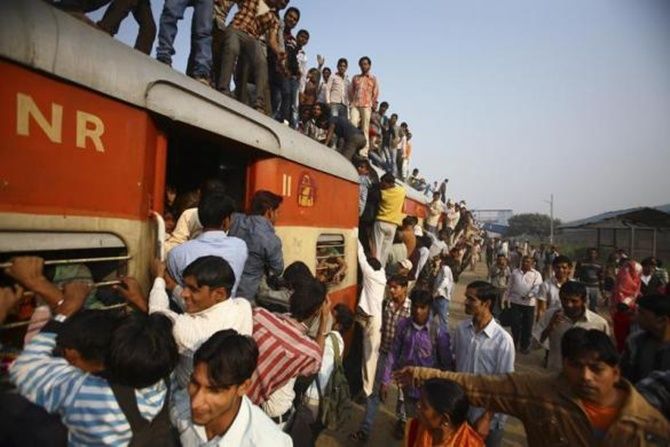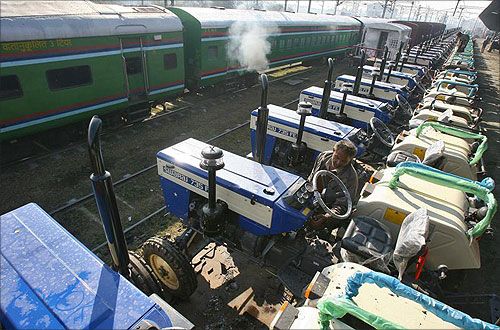 | « Back to article | Print this article |
The financial situation of Indian Railways has been deteriorating and passenger amenities are in shambles.

Indian Railways is currently implementing a project that involves laying of a broad gauge line connecting Nangaldam to Talwara in Himachal Pradesh.
Nothing surprising about it, except that the project is being implemented since March 1981. The cost has jumped 28 times from the originally estimated Rs 37 crore (Rs 370 million) to Rs 1,036 crore (Rs 10.36 billion) now.
The project is among 288 rail projects facing time and cost overrun. The projects have seen a cost overrun of Rs 1,11,000 crore (Rs 1.11 trillion) - around 65 per cent of the total cost overrun of Rs 1,72,000 crore (Rs 1.72 trillion) in 720 delayed projects costing Rs 150 crore (Rs 1.5 billion) or more across 13 sectors - power, coal, steel, aviation, roads, shipping, telecom, etc.
.jpg?w=670&h=900) This is part of the mess inherited by the new railway minister, Suresh Prabhu who assumed charge on Monday.
This is part of the mess inherited by the new railway minister, Suresh Prabhu who assumed charge on Monday.

As tricky are issues relating to rising expenditure on fuel and pay for India’s largest employer; stagnant passenger volumes; erosion in the share of railways in the freight market; slow progress of private-public partnership (PPP) projects; and lack of modernisation and upgradation of infrastructure, leading to accidents.
This state is directly reflected in the railways operating ratio (OR), the money spent to earn Rs 100. It is budgeting to meet an OR of 92.5 this financial year, the highest in four years and worse than 90.8 recorded in the last financial year.
The current year’s OR target is premised on a projection of a 14 per cent jump in gross traffic receipts to Rs 1,60,165 crore (Rs 1.60 trillion).

This incorporates a projected 12.5 per cent jump in freight earnings to Rs 1,05,770 crore (Rs 1.05 trillion) and a rather ambitious 19 per cent jump in passenger earnings to Rs 44,645 crore (Rs 446.45 billion).
Total expenditure is estimated to rise 16 per cent to Rs 1,49,175 crore (Rs 1.49 trillion).
The performance in the first half of 2014-15 has not been quite up to the mark. Freight earnings rose 10.5 per cent to Rs 48,062 crore (Rs 480.62 billion) between April and September, the first six months of the financial year, which is well behind target.
And, freight volume rose only 4.2 per cent, to 532 million tonnes (mt), showing any rise in earnings is driven by higher rates, rather than volume. No wonder the roads network continues to eat into the railways share of the freight market.

“The railways financial situation has been deteriorating and passenger amenities are in shambles. There has been no serious effort to improve the condition, owing to the policy makers' attitude of running the railways as a social service. The overall situation is critical and needs urgent intervention. The new minister will have to look into these issues,” says Vishwas Udgirkar, senior director at Deloitte.
He adds the railways has for long required effective steps to tackle short-term issues on lack of efficiency and low quality of passenger services, beside the long-term challenges of infrastructure and capacity constraints. It has been lagging on both, for a variety of reasons.
Prabhu has also inherited multi-year delays in implementation of PPP projects. This includes a part of the Rs 18,000-crore (Rs 180 billion) Dedicated Freight Corridor (DFC) project and the Madhepura and Marhora rail coach factories, planned to be built in Bihar and West Bengal, respectively.
While the DFC project was to be completed in 2016, the railways is now targeting completion of the Delhi-Mumbai and Delhi-Ludhiana stretches on the western and eastern arms by 2018.

“The principal cause of failure in rolling out PPP projects is the lack of clarity on the policy governing private participation. The private investor is interested in projects with assured return like freight and operation of mainland trains. These are not being planned under PPP. Also, lack of a dedicated rolling stock leasing agency and a regulator are deterrents for private participation,” said former financial commissioner R Sivadasan.
The railways ministry had recently announced new policies were being devised, procedures being simplified and greater decentralisation in decision-making being introduced, to remove hurdles for private investors.
The new government has said five different PPP models are being prepared, including investments for station development, construction of freight terminals and new lines to provide port connectivity.
Problems To Tackle